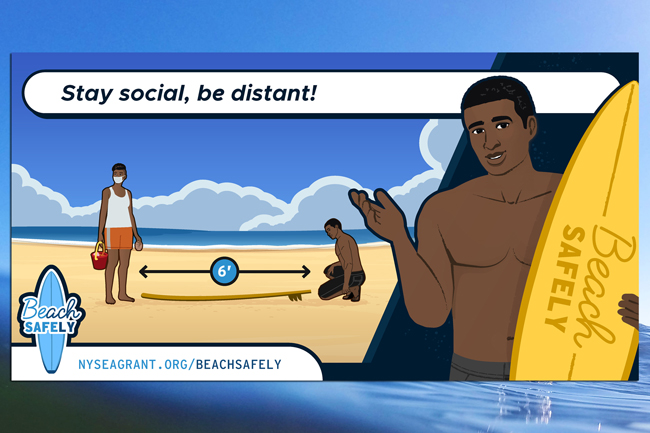
One of nine Beach Safely message posters developed by New York and New Jersey Sea Grants for the summer of 2020. See more at www.nyseagrant.org/beachsafely. Credit: Joel Davenport (beach graphic)
Contact:
Kathleen Fallon, NYSG Coastal Processes & Hazards Specialist, P: 631-632-8730, E: kmf228@cornell.edu
New York Sea Grant partnered with New Jersey Sea Grant to develop a successful social media campaign to encourage beachgoers to be safe and observe COVID-19 regulations
Stony Brook, NY, March 8, 2021 - Due to the COVID-19 pandemic, the summer of 2020 was unlike any other experienced in recent history. While many social gatherings were discouraged, outside public spaces remained open and operating at a reduced capacity. Beaches became even more relevant as a place to which people could "escape." New York Sea Grant (NYSG) recognized and responded to the need to develop and promote messages that would encourage people to continue to enjoy the beach, but be aware of both COVID- and water-related potential physical and health hazards, how to avoid them, and how to stay safe.
NYSG and New Jersey Sea Grant collaboratively developed nine bilingual (available in English or Spanish), graphically-illustrated posters with messages that included: “Stay social, be distant”; “Don’t let your mask become marine debris!”; “Break the grip of the rip”; “Grab your sunscreen and sanitizer”; and “Stay dry when waves are high”. One message per week was promoted via social media throughout the summer. This #BEachSAFEly social media campaign was widely successful and received praise from a number of Sea Grant programs, the National Sea Grant Office, other organizations, and local media.
On Facebook, NYSG’s #BEachSAFEly posts reached more than 9,345 stakeholders and received 738 engagements (likes, shares, comments) from organizations like the National Oceanic and Atmospheric Administration (NOAA), Cornell University, Stony Brook University, the Association of Marine Industries, the New York State Department of Environmental Conservation, Weather Ready Texas, and others. On Twitter, the content gained 22,724 impressions (how many times a tweet was seen) and 653 engagements from partners such as various NOAA line offices, Steven’s Institute of Technology, Hofstra University, The Cooperative Institute for Great Lakes Research, and Florida’s Department of Fisheries, Ecology, and Conservation. Overall, the average engagement rate for this campaign was almost 10 times higher than what is considered high engagement.
Project Partners:
• New Jersey Sea Grant
• Funding: National Sea Grant Office COVID-19 Rapid Response grant
More Info: New York Sea Grant
New York Sea Grant (NYSG), a cooperative program of Cornell University
and the State University of New York (SUNY), is one of 34 university-based
programs under the National Oceanic and Atmospheric Administration’s
National Sea Grant College Program.
Since 1971, NYSG has represented a statewide network of integrated
research, education and extension services promoting coastal community
economic vitality, environmental sustainability and citizen awareness
and understanding about the State’s marine and Great Lakes resources.
Through NYSG’s efforts, the combined talents of university scientists
and extension specialists help develop and transfer science-based
information to many coastal user groups—businesses and industries,
federal, state and local government decision-makers and agency managers,
educators, the media and the interested public.
The program maintains Great Lakes offices at Cornell University, SUNY
Buffalo, SUNY Oswego and the Wayne County Cooperative Extension office
in Newark. In the State's marine waters, NYSG has offices at Stony Brook
University in Long Island, Brooklyn College and Cornell Cooperative
Extension in NYC and Elmsford and Kingston in the Hudson Valley.
For updates on Sea Grant activities: www.nyseagrant.org has RSS, Facebook, Twitter, Instagram, and YouTube links. NYSG offers a free e-list sign up via www.nyseagrant.org/nycoastlines for its flagship publication, NY Coastlines/Currents, which is published quarterly.